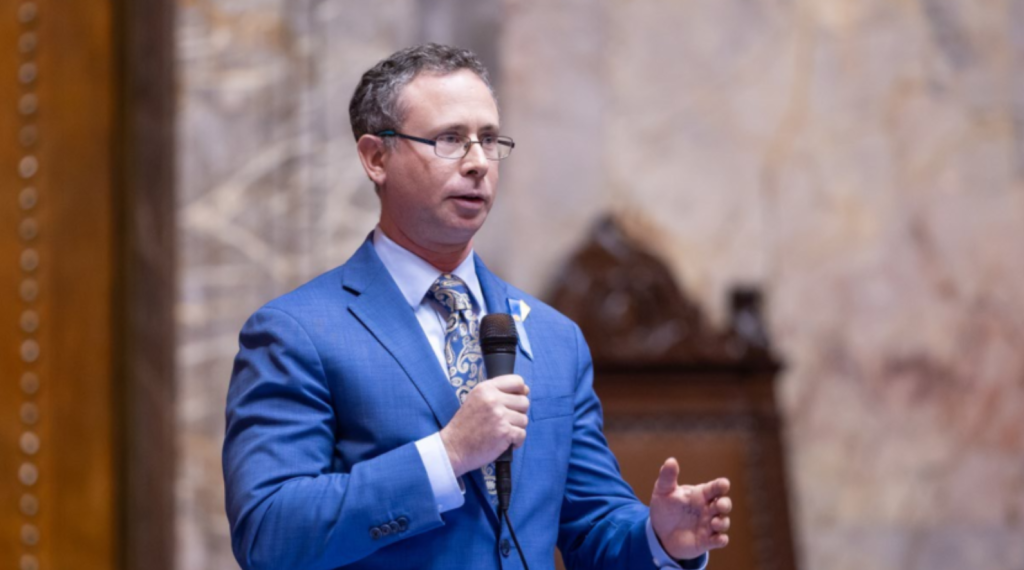
The Washington State Senate is implementing major changes to committee leadership and structure ahead of the 2025’s state legislative session, due in part to significant turnover of its members. In one of the splashier moves, Senator-elect Jessica Bateman (22nd LD, Olympia) will chair a reconfigured Housing Committee, raising hopes of passing major housing legislation.
Following a vote Thursday, numerous committees have been tweaked, leaving even fewer seats for Republican members on key committees. In the November election, Democrats defended all of their seats and flipped one seat from Republicans, and now have a 30-19 senate majority.
The state senate’s Democratic caucus is set to see a dramatic overhaul, with eight new members joining their ranks next year. Five of those new members have already been elected, including Senator-elect Adrian Cortes (18th Legislative District, Battle Ground), who flipped his seat with a narrow win against Republican Brad Benton. Three more members will be appointed in the coming weeks as Senators Karen Keiser, (33rd LD, SeaTac) Patty Kuderer (48th LD, Bellevue), and Emily Randall (26th LD, Bremerton) vacate their seats. Kaiser is retiring, while Kuderer and Randall won higher office.
Following the departure of Senator Andy Billig (3rd LD, Spokane), Jamie Pedersen (43rd LD, Seattle) will take the reins as Majority Leader next year, the first time in decades that the legislature’s upper chamber will be lead by someone from the state’s largest city. Widely seen as a moderate, Pedersen had a reputation for running the senate like a Swiss watch as floor leader.
The Senate’s Housing Committee will go from 11 members to just seven, with five seats to be held by Democrats including Bateman, the new chair. The fact that such a high-profile committee chair was awarded to a first-year senator is clearly intended to be a sign of the caucus’s commitment to make additional progress in the area of housing affordability.

Bateman, who has served in the state house since 2021, was one of the architects of House Bill 1110, 2023’s middle housing law that represented a sea change in the legislature’s approach to land use policy. In 2024, she introduced the Housing Accountability Act, a bill that seems sure to return in some form. That bill included a builder’s remedy that would have added even more pressure on cities that resist the state’s overtures to boost housing creation and ease restrictions on more affordable housing types.

Bateman’s Housing Committee will include other pro-housing voices, including Yasmin Trudeau (27th LD, Tacoma). Trudeau introduced 2024’s version of a transit-oriented development bill on the senate side, which would have required cities to create housing capacity around light rail stations and bus rapid transit stops. The Housing Committee is also holding a spot open for someone who will fill the vacancy in the 33rd Legislative District, with SeaTac Representative Mia Gregerson, the author of 2023’s overhaul of accessory dwelling unit (ADU) regulations, widely expected to throw her hat in the ring for the appointment.
Other committees are also set to be reconfigured for next year’s session. The powerful Ways and Means Committee, which touches all bills that have an impact on the state budget, will add a new position: vice chair of finance, a role to be filled by Senator Noel Frame (36th LD, Seattle). That will give Democrats an even bigger margin there, after several years of seeing bills fail to pass due to the defection of one or two members.
In addition to a transit-oriented development bill, widely expected to return with potentially two competing bills, the 2025 session will almost certainly see the reintroduction of a rent stabilization bill, after it failed to advance out of the Ways and Means Committee earlier this year. Two of the staunchest rent stabilization opponents have departed in Senators Kevin De Wege (24th LD, Sequim) and Mark Mullet (5th LD, Issaquah). Both vacated their seats to seek higher office but came up short.
The Local Government Committee, another major avenue for land-use bills, will be chaired by Jesse Salomon (32nd LD, Shoreline). Bateman will serve on that committee, along with former chair Liz Lovelett (40th LD, Anacortes), who has been elected Deputy Majority Leader. A small five-member committee, several high-profile bills saw extreme overhauls during the 2024 session in order to secure three votes, including a bill that had been set to legalize neighborhood cafes in residential areas across the state. After a full rewrite was adopted in that committee that looked like it would prevent existing neighborhood cafes from selling beer and wine, the bill failed to make it to the floor.

With the state facing a general fund deficit between $10 billion and $12 billion through 2029, along with significant revenue issues in the transportation budget, the legislature clearly has its work cut out for it in the coming years. The Transportation Committee will continue to be chaired by Marko Liias (21st LD, Edmonds), who’s held the post since 2021.
Liias has steered transportation policy in the direction of being more focused on traffic safety and public transit, even as the state shepherds a slate of highway megaprojects, including the Interstate Bridge Replacement project and the final pieces of the 520 Bridge Replacement.
The 105-day legislative session is set to start on January 13, with pre-filed bills starting to drop daily starting on December 2.
Ryan Packer has been writing for The Urbanist since 2015, and currently reports full-time as Contributing Editor. Their beats are transportation, land use, public space, traffic safety, and obscure community meetings. Packer has also reported for other regional outlets including BikePortland, Seattle Met, and PubliCola. They live in the Capitol Hill neighborhood of Seattle.

